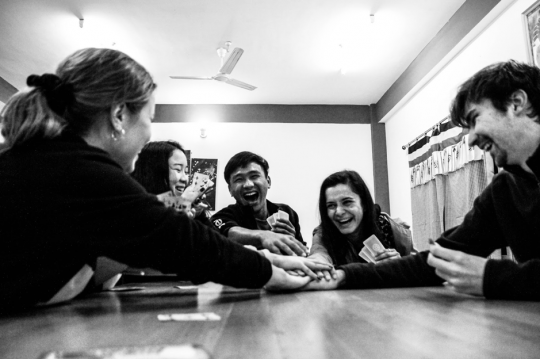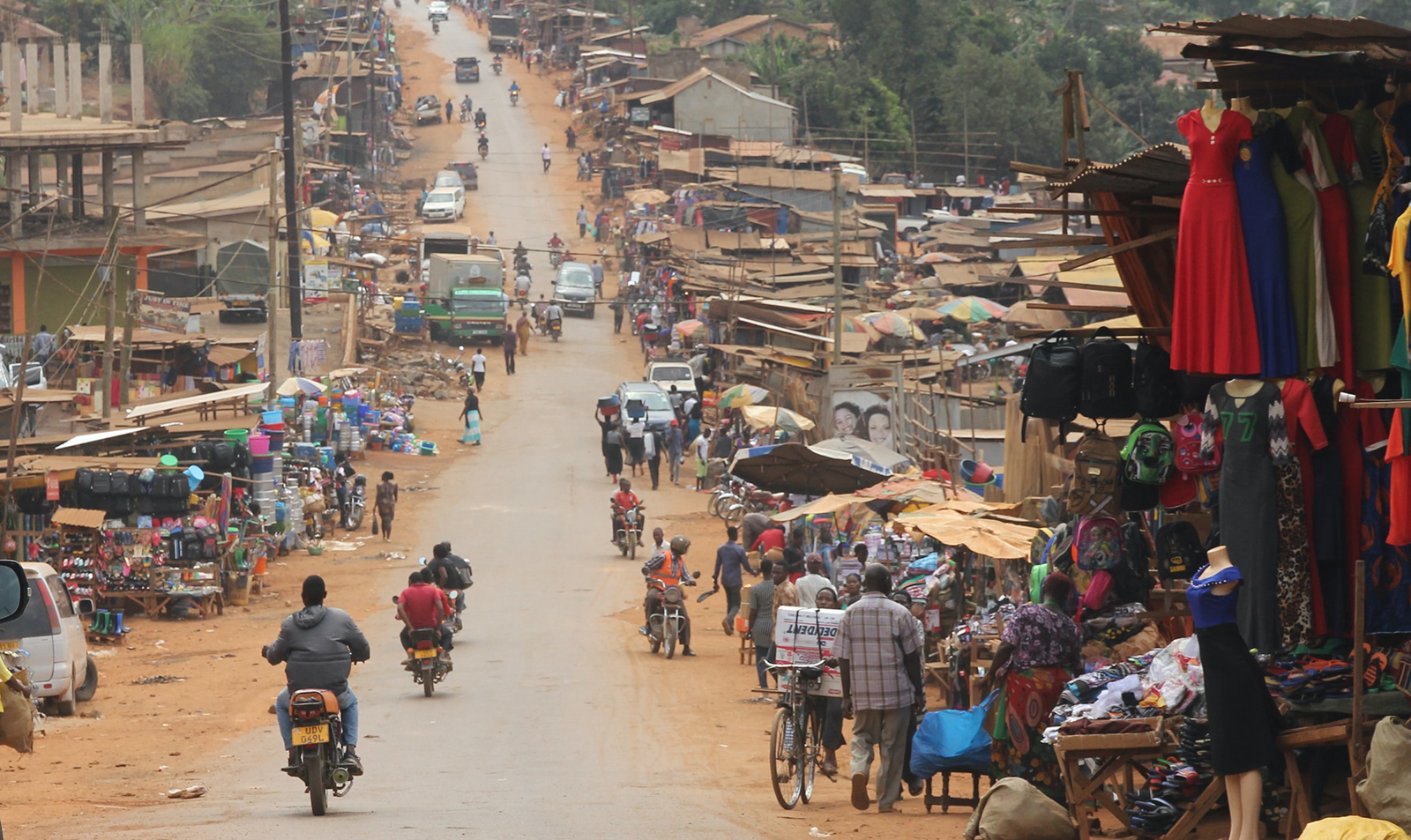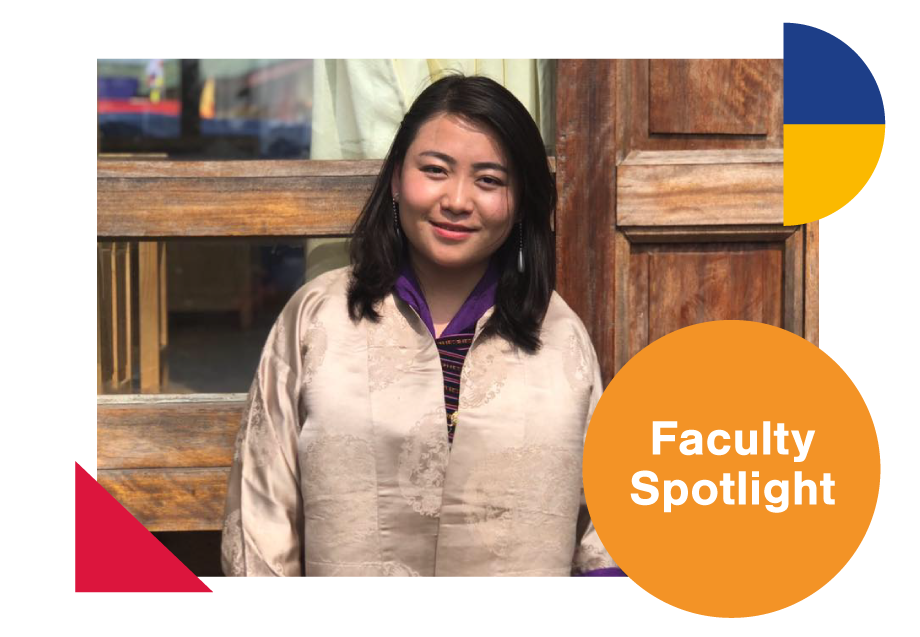The Aalto team was formed by students Daniela Tapprest, Mona Fritz, Gaspard Del Marmol, Helmi Korhonen and Félicia Zhang, accompanied by SGT Coordinator Matleena Muhonen and the team’s mentor, WAT researcher Matias Heino. The JNEC team, on the other hand, was formed by Lobzang Chophel, Laxmi Sharma, Namgay Wangmo, Karma Choden and their mentor, lecturer Phurba Tamang. (Photo by Studio Sajo)
Through the years, increasing amounts of produced inorganic waste in most parts of Bhutan have led to the open dumping and burning of waste, practices which have a considerable impact on the environment. Student teams from Aalto University and Jigme Namgyel Engineering College (JNEC) conducted a case study focusing on sustainable approaches to landfilling in the municipal landfill Matanga in Samdrup Jongkhar, a south-east district close to the border with India. The students shared their experience with Aalto Global Impact to give a glimpse of what they have experienced.
Understanding the objectives
The Aalto University and JNEC teams got an easy-going start to their relationship as they began to plan and work online months before the Aalto team was planned to join JNEC for an on-site field trip in Samdrup Jonkhar. The students had a common objective: preventing the accumulation of waste in nature and the uncontrollable growth of landfills. They felt great responsibility for their assignment, as the issue they were tackling was complex and offered no easy solutions. The two teams struggled at first with frustration as they realised that their initial readings of the problem didn’t match. Their approaches were different, one concentrating on educational awareness and the other on technical approaches. It soon became clear however that through joint discussions and brainstorming sessions they could identify a common angle from which to work on.
Coming together: first impressions
Digging deeper into waste management dynamics brought forth the complexity of the problem. While interviewing stakeholders the students found that there was vast information on the sustainability challenges and practical needs related to the landfill. This however wasn’t leading to improvements as proper waste collection and segregation systems were not in place. The students realized that the location of the landfill itself created further challenges, as pollution and waste were accumulating, affecting also adjoining areas and streams that flow across the border with India. The teams were also figuring out their internal project dynamics: working together for the first time, they felt uncertain about how to use a collaborative PBL approach to work on the material they had collected and how they could make a difference within the time and study hours they had ahead of them.
Félicia, a student of Aalto University, described the process as a learning curve. It was not about immediately jumping into facts and solutions, but about learning to work through the little things, such as making the most of how information was collected little by little when visiting different locations and meeting people, and allowing time to see the linkages appear. Shaking off the initial nervousness and fear became easier as days went by, thanks to a strong sense of hospitality and friendliness that surrounded the collaboration. From how the Aalto team was welcomed by JNEC with traditional scarfs and tea, to taking relaxing walks and brainstorming ways to move forward, each encounter eased the way into the case and the joint work.
“I felt so incredibly welcome. Each and every person we met was so motivated to work with us. Such friendly people.”
– Mona, Aalto University student
Communication and participation: What was the role of Problem-Based Learning (PBL)?
The students and their mentors paid close attention to teamwork and its unique dynamics as an essential part of the collaboration. They applied a Problem-Based Learning (PBL) approach to identify the aspects of the landfilling problems they would choose to focus on, closely reflecting the local circumstances, resources and requirements. PBL is a learner-centered approach to tackling issues through research, practice, and with supportive tutoring that guides the learning experience, and it was particularly applied to allow the students to develop their professional skills and abilities to facilitate such projects in the future.
Every time new information on the case appeared, the students would reframe and strategize their concept. Daniela from Aalto University mentions that the designing and prototyping of a compost for the student hostels at JNEC was not part of the plan until they realised there was yet no proper way to treat biowaste there. The PBL approach emphasized systematic teamwork, and JNEC student Laxmi was pleasantly surprised about how even though this approach did change their plans, it improved their working techniques. Mutual understanding and active participation were pivotal during the two weeks the teams worked together. Students knew they had to proactively establish trust and open-mindedness, considering their different academic and cultural backgrounds. Tasks were divided, wrap-up sessions conducted, healthy coffee breaks were mandatory and honest communication was encouraged from day one. Everyone seemed to agree that motivation was never an issue, but this helped overcome the initial lack of confidence that came with the novelty of the situation.
A few bumps in the road: understanding the bigger picture Facing difficulties is inevitable, and this was no exception. Smooth teamwork comes with a learning process also made of slopes along the way. Initially, the teams didn’t work together as much as they would have liked as their pre-planned objectives didn’t quite match; however, they decided to join forces and collaborate on a common project, the compost pit, which turned out to be a fitting match for their different backgrounds, experiences, and learning objectives.
Also, time became scarce as the students were struck by the first consequences of COVID-19. They mention this as one of their biggest struggles, as it was a sudden and disruptive change of plans.
Before parting ways the students had created a prototype for a composite pit for the JNEC student hostels. They had written different scenarios for how the compost project would proceed, created a user map with drawings of the users and made a prototype of an educational board game about waste management in Bhutan. They took home numerous learnings. The teams highlight how the process helped them learn and understand about PBL, teamwork, flexibility and adaptation to complex settings. JNEC’s mentor Phurba, who together with Aalto University’s mentor Matias emphasized the bigger picture of this collaboration, pointed out that combining these factors in a multidisciplinary project on sustainability-based issues proved to be a great platform to understand real-life scenarios and how research and education can contribute through an analytical process that allows to design better ideas and solutions.
Long-lasting memories and learnings As a side-product of the learning process, students highlight the exceptional personal learnings related to mindsets, etiquettes, countries and ways of working in cross-cultural settings. The Aalto University students remarked how much hospitality affected the whole process, as they experienced a sense of serenity everywhere they would go and enjoyed feeling a constant sense of peace and respect that made them feel extremely welcome.
“I think it’s always valuable to meet with people, exchange ideas and to understand how things are done elsewhere. For me, it seemed that JNEC was already very advanced in PBL, and I think Aalto would have a lot to learn from them. For example, several structures and buildings in the campus area were built by students as a part of their curriculum.”
– Matias, Aalto University mentor

Photo by Studio Sajo
Many remarkable moments stood out, ranging from brainstorming sessions and final presentations to meeting His Majesty the King of Bhutan. These moments allowed for a deeper connection and exchange of knowledge, but also personal reflection. The Aalto students were mesmerized by a visit to a local monastery to attend an ongoing ceremony; as Gaspard from Aalto University tells us, they will remember “all the moments we had the opportunity to share with the Bhutanese outside of the working time. Whether it is around dinner, a game of sport, a card game, a party or simply a nice walk”.
[The Sustainable Waste Management project is part of this year’s Aalto Global Impact’s PBL South Asia initiative in collaboration with the Sustainable Global Technologies programme (SGT) of Aalto University and the Jigme Namgyel Engineering College (JNEC) in Bhutan. The Jigme Namgyel Engineering College is one of the constituent colleges of the Royal University of Bhutan (RUB). JNEC is currently undergoing a change in their curricula by implementing PBL principles and teaching methods. The student case presented here was jointly organized by JNEC’s Project Work course, Aalto University’s SGT studio course and Aalto Global Impact, which promotes and facilitates Aalto University´s research and educational programmes for societal impact globally.]
The European Commission’s support for the production of this publication does not constitute an endorsement of the contents, which reflect the views only of the authors, and the Commission cannot be held responsible for any use which may be made of the information contained therein.
This post was written by AGI




